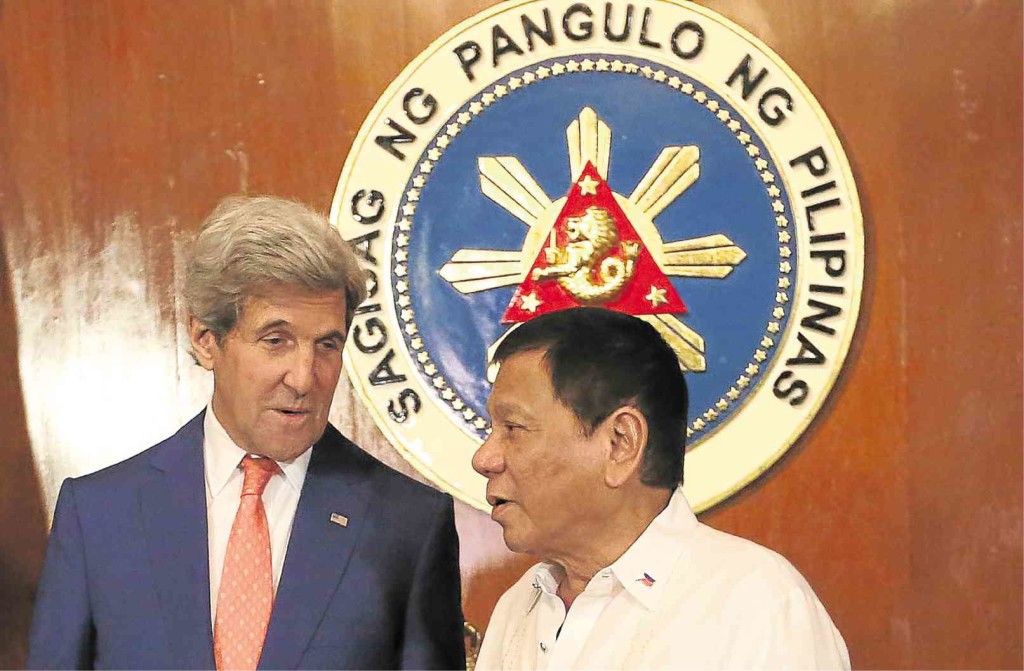
KERRY’S COURTESY CALL US Secretary of State John Kerry pays a visit to President Duterte in Malacañang. Kerry supports China’s call for bilateral talks with the Philippines after an international court ruled that China’s claim over almost all of the South China Sea was illegal. JOAN BONDOC
President Duterte on Wednesday told visiting US Secretary of State John Kerry the Philippines would negotiate its territorial dispute with China using as basis the recent international arbitral decision upholding the legitimacy of the Philippine position.
Kerry, the highest ranking US official to meet with Mr. Duterte since his election in May, paid a courtesy call in Malacañang hours after expressing support for Foreign Secretary Perfecto Yasay’s moves to start bilateral talks with China.
“The President did mention that whatever talks we will engage in will begin with the ruling, that will be the foundation, the ruling regarding the area,” the President’s spokesperson, Ernesto Abella, later told reporters.
Asked about China’s insistence that the Philippines must disregard the international tribunal’s decision for bilateral talks between the two to move forward, Abella said the situation was “not a stalemate.”
“Conversation will continue to proceed,” he said.
Abella said there was no discussion between Mr. Duterte and Kerry about the PH-US Enhanced Defense Cooperation Agreement (Edca) with regard to the implementation of the arbitration court’s ruling invalidating Beijing’s claim to nearly the whole of the South China Sea.
The two issues are not related, he said, reiterating an earlier assertion from the Department of Foreign Affairs (DFA).
Yasay earlier on Wednesday met with Kerry, who arrived on Tuesday night, for a 24-hour visit to congratulate Mr. Duterte on his election victory.
PH plans
Yasay said he and Kerry discussed Philippine plans to negotiate with China.
“China and Philippines are both signatories to United Nations Convention on the Law of the Sea (Unclos) and consistently expressed adherence to international law and abiding commitment to Unclos,” Yasay said in a press briefing on Wednesday.
Yasay said former President Fidel V. Ramos had accepted the offer of President Duterte to be the special envoy to negotiate with China.
He said the Philippines hoped “to settle our disputes as regards South China Sea” even if China refused to use as framework the arbitral tribunal ruling.
“It may or may not happen, but the objective is to resolve the disputes based on international law and Unclos,” Yasay said.
Kerry said the United States supported the Philippines in its “responsible and measured way” of responding to the South China Sea tensions.
Legally binding
While the United States is not a claimant in the South China Sea, Kerry said “we do take a strong position in protecting the rights, freedoms and lawful uses of air, sea space (of countries) as defined by the international law.”
He emphasized that the arbitration court’s decision “is legally binding and the rights of all countries should be respected.”
“We urge all the claimants to exercise restraint and work to reduce tension,” said Kerry in a statement at the bilateral press briefing at the Department of Foreign Affairs.
America’s top diplomat said in a joint press conference with Yasay that the United States wanted China and the Philippines to engage in talks and “confidence-building measures.”
“The decision itself is a binding decision but we’re not trying to create a confrontation. We are trying to create a solution mindful of the rights of people established under the law,” Kerry said.
The UN-backed Permanent Court of Arbitration based in The Hague this month ruled that China’s claim to most of the strategic waterway was illegal and baseless. The decision angered Beijing, which vowed to ignore the ruling.
Turning a page
But Kerry said the United States saw an “opportunity” for claimants to peacefully resolve the row.
“We hope to see a process that will narrow the geographic scope of the maritime disputes, set standards for behavior in contested areas, lead to mutually acceptable solutions, perhaps even a series of confidence-building steps,” he said.
Vietnam, Malaysia, Brunei and Taiwan also have claims to the South China Sea, a vital waterway through which $5 trillion in annual trade passes. It is also believed to sit atop vast reserves of oil and gas.
Kerry, who attended a regional summit in Laos, earlier told reporters he would encourage Mr. Duterte, who assumed office on June 30, to engage in dialogue and “turn the page” with China.
China’s Foreign Minister Wang Yi had asked Kerry to lend his support for bilateral talks to restart between Manila and Beijing in a meeting between the two in the Laotian capital of Vientiane on Monday.
“The foreign minister said the time has come to move away from public tensions and turn the page,” Kerry told a news conference. “And we agree with that … no claimant should be acting in a way that is provocative, no claimant should take steps that wind up raising tensions.” With reports from the wires